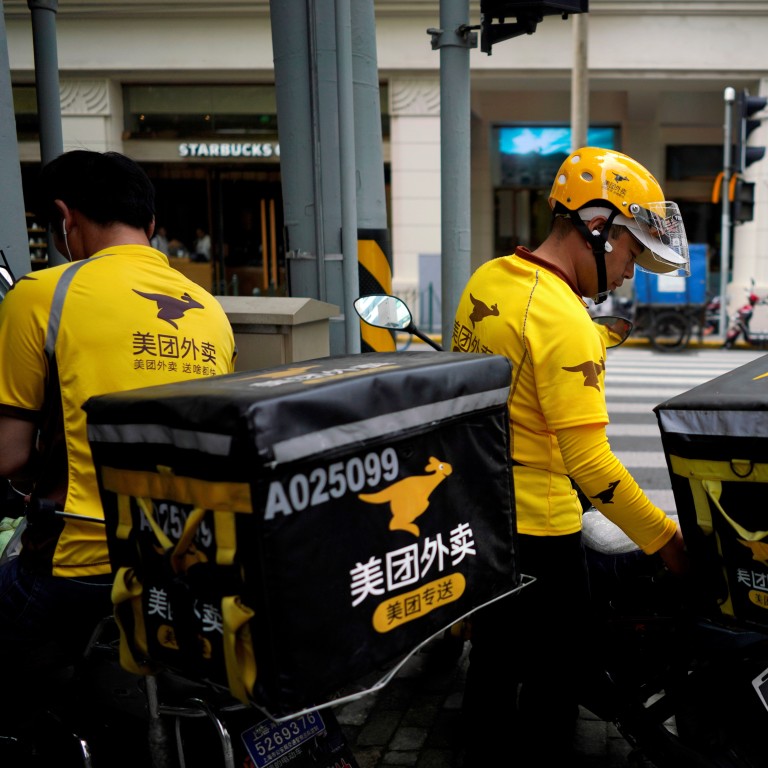
China moves to protect food delivery drivers from digital exploitation, knocking stocks such as local services giant Meituan
- The policy guidelines come as China ramps up a campaign to rein in Big Tech, forcing the sector to put greater emphasis on consumer and worker rights
- The guidelines are designed to protect basic labour rights for riders, including a base income, work safety, food safety, a decent working environment
Chinese regulators have ordered online platforms to ensure food delivery riders earn above the country’s minimum wage, be freed from unreasonable demands placed upon them by algorithms, and have access to social security and a place in a union, in a likely financial blow to Meituan and other big on-demand services providers in the country.
The new guidelines, published on Monday by the State Administration for Market Regulation (SAMR) and six other government agencies, are designed to protect basic labour rights for riders, including a base income, work safety, food safety, a decent working environment and access to insurance coverage.
The guidelines come as China ramps up a campaign to rein in Big Tech, forcing the sector to put greater emphasis on consumer and worker rights. The tighter regulatory scrutiny has seen Chinese tech stocks plunge in Hong Kong in recent sessions with Meituan, which employs about 3 million riders delivering an average of more than 27 million food orders a day in 2020, falling 14 per cent on Monday.
The guidelines also come in the wake of complaints by riders that they lack proper labour safeguards and could signal more regulation when it comes to gig economy employment rights. SAMR made its announcement just days after the Ministry of Human Resources and Social Security, along with seven other government agencies, published separate guidelines on guaranteeing the basic rights of workers in “new employment forms”. This goes beyond food deliverymen to include drivers on ride hailing platforms and other delivery riders.
“The two sets of guidelines make the legal relationship between the online platforms and gig workers clearer, which used to be very controversial as platforms like Meituan and Ele.me outsourced their delivery services to third-party companies,” said Liu Jia, a lawyer at Yingke Law Firm’s Hangzhou office. “This will definitely increase costs for these online platforms.”
On-demand local services platforms must ensure that riders earn above the minimum wage in the area where they operate, according to the guidelines. They also prohibit platforms from using the most stringent algorithm to benchmark a rider’s performance. Instead, platforms have to use a moderate algorithm that can “appropriately allow more time for riders to finish their deliveries”.
The guidelines also require platforms to help riders gain access to social security as well as commercial insurance, including coverage for accidents and sickness. Platforms have also been directed to build “union organisations” and play an active role in recruiting riders into these unions, so that they can participate in negotiating labour rights.
Regulators also urged the industry to improve the general working conditions of riders, including such things as rest stations for riders, smart meal-retrieval cabinets and smart helmets for riders to boost safety.
Labour issues at big services platforms such as Meituan and Ele.me, owned by Alibaba Group Holding, have come under scrutiny in recent years. In April, a government video showing a local labour official working an arduous 12-hour shift as a Meituan employee went viral on Chinese social media. Alibaba owns the South China Morning Post.
The two-minute clip, shared by the Beijing Municipal Human Resources and Social Security Bureau, featured the deputy director of the bureau’s labour relations division spending a day working as a Meituan delivery driver in the Chinese capital.
The director was filmed rushing around Beijing on a motorbike to pick up food orders while struggling with the city’s infamous congested traffic. At one point he was 20 minutes late, resulting in a 60 per cent penalty cut in his delivery fee. He earned a meagre 41 yuan (US$6.3) at the end of his first day.
In 2019, one of Meituan’s deliverymen stabbed a supermarket staffer to death, prompting a debate on social media over the pressures faced by such workers. Meituan then made a statement pledging improvements to its platform.
The company also recently found itself under scrutiny by the SAMR over whether it forced merchants to sell exclusively on its platform. The regulator announced an investigation into Meituan on April 26 after receiving complaints from the public.
Additional reporting by Jane Zhang

